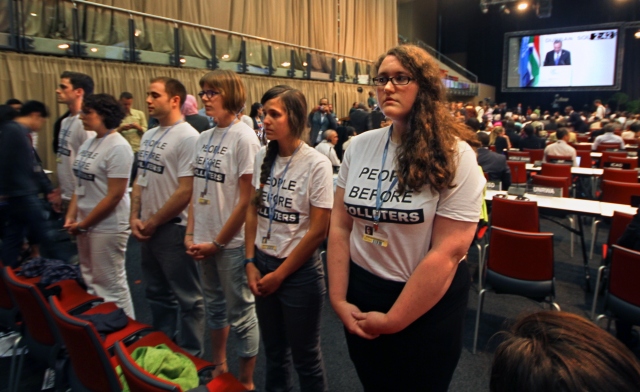We live in a country whose leaders appear willing sacrifice our collective future to appease the short-term needs of Big Oil.
Take, for example, Stephen Harper’s recent declaration that he wants the Enbridge pipeline to go ahead, despite the overwhelming First Nations and public opposition in B.C. In a recent Global TV interview, Harper adamantly declared that the Enbridge pipeline is in best interests of Canada. He went on to say “American interests would line up against the Enbridge pipeline,” and would “funnel money to environmentalists and others to delay the project.”
But we shouldn’t worry because dear ole Harper will “make sure that the best interests of Canada are protected.”
Harper made this statement the very same day it was leaked that Canada plans to pull out of the Kyoto Protocol, likely over the holiday season. The Canadian government has continually undermined the Kyoto Protocol and in general obstructed the progress of international climate talks.
This is just one of a number of ways that Canada is blocking progress at international climate negotiations. It leads me to wonder which Canadians Harper is really representing.
As a young, indigenous Canadian, the consequences of climate change worry me greatly. I grew up in Kamloops, slowly watching our trees grow red and die from pine beetle — a phenomenon that could have been stopped by just one cold winter.
All over this country, the effects of climate change are already being felt. In Canada’s Arctic, permafrost is melting and ice disappearing. The chemistry of the ocean is changing because of increased CO2 leading to massive oyster die-offs in the Pacific Northwest and other serious impacts from ocean acidification.
And all this is just the start. The latest climate science is always a depressing read. Despite public pressure, despite global scientific consensus, despite the best efforts of impacted countries like the Maldives — carbon dioxide emissions continue to rise. According to the U.S. Department of Energy, 2010 saw the biggest ever jump in the output of heat-trappingcarbon dioxide.
There was a six per cent increase in worldwide emissions from 2009 to 2010, with 564 million more tons (512 million metric tons) of carbon into the air. That doesn’t sound like the governments of the world are taking this seriously.
The increased emissions can be explained by the feverish tempo at which we are digging up and burning fossil fuels. The tar sands continue to grow. Global production of natural gas is on the rise, as is coal mining. All of this activity comes with serious consequences for the climate — consequences that will be felt by my generation.
The climate crisis is one of the defining issues of our time and as young people we feel an intense responsibility. We live with the knowledge that our future is uncertain. Will weather patterns change? Will sea levels rise? Will crops be able to grow?
And even if somehow we don’t feel the impacts, I know that my children will.
With these serious questions weighing on my mind on a regular basis, I would expect a government that will at least pretend to take this issue seriously. But the Harper government is nowhere on the climate file. As the Durban climate talks wind down, Canada is well on our way to earn yet another “Fossil of the Year” award for their efforts to block progress at negotiations.
Canada, it must be said, is now an international disgrace when it comes to climate change. Leaders from Africa, including Archbishop Desmond Tutu, are calling us out. Emerging power houses China and Brazil are asking Canada to smarten up when it comes to Kyoto. In terms of our reputation on environmental issues, we have fallen very far from the country that was a leader in signing the Montreal Protocol.
Prime Minister Harper has made it clear that he values promoting the tar sands over protecting the environment and investing in climate solutions.
This government is effectively selling out my generation’s future to promote expansion of the tar sands.
Perhaps worst of all, the Harper government has taken to suggesting that people who are concerned about climate change are un-Canadian, or “extremist.” These are extremely irresponsible and harmful efforts to suppress dissent.
As I young Canadian, I expect a government that takes this risk to my future seriously, and that means seriously pursuing solutions to the climate crisis.
Harper was elected by a minority and he is clearly pursuing the interests of a small minority when it comes to the tar sands and climate change. That’s why my generation is determined to put a stop to this dangerous course, and to restore Canada’s name in the global community.




